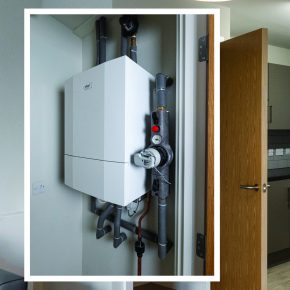
Can LST radiators be installed in listed buildings?
Contour discusses installing LST radiators into listed buildings and what considerations have to be taken into account during the process.
A listed building or structure is one that is of historic significance and has been placed on one of the four lists managed by Historic England, Historic Environment Scotland, Cadw Wales and The Northern Ireland Environment Agency. As a result, listed buildings can’t be demolished or altered without specialist permission from the local planning authorities and consultation with central governments.
Typical examples of listed buildings are:
– Churches, chapels, cathedrals and monasteries
– Castles
– Stately Homes
– Theatres and Town Halls
– Government buildings such as The Palace of Westminster
– Old school and college buildings
– Foundries and factories with historical significance
– Points of interest such as Abbey Road Recording Studio
Listed buildings often include features which cannot be adapted, moved or demolished and will have to worked around to install LST radiators.
Specialist listed building consent will have to be acquired before any work can begin to install a heating system into the space to ensure that the building can be safely adapted to accommodate the LST radiators without damage.
Some planning offices may request that there is little to no scarring to the building that would indicate work has been completed. No matter what restrictions have to be worked around, it’s vital that everybody, particularly those installing the LST radiator, understand what’s expected of them.
With a systematic approach, installation of LST radiators into listed buildings can be done without damaging any of the existing building.
Many post 19 th century listed buildings may have pipework in the flooring which, depending on weather or not this needs to be replaced, may make this space suitable for a free standing LST radiator rather than a wall mounted one.
If this is the case it will be established during the survey stage of installing them to ensure that the process is smooth throughout and that you get the right heating system for the space.
In most listed buildings it’s recommended that you use hot water heating systems rather than electric or underfloor heating because they can require serious altercations to the structure of the building. Similarly, it’s important to find a permanent heating solution such as LST radiators rather than make use of portable ones because they pose a fire risk.
Contour can be contacted at;
The Mansions
43 Broadway
Shifnal
TF11 8BB
Tel: 01952 290 498
Email: sales@contourheating.co.uk
Visit Supplier's page
Latest news

28th April 2025
Nuaire first UK ventilation manufacturer to use low carbon-emissions recycled & renewably produced steel
Nuaire has announced that its Magnelis® steel based ventilations systems are now being made from XCarb® recycled and renewably produced steel.
Posted in Air Conditioning, Articles, Building Industry News, Building Products & Structures, Building Services, Building Systems, Heating, Ventilation and Air Conditioning - HVAC, Restoration & Refurbishment, Retrofit & Renovation, Steel and Structural Frames, Sustainability & Energy Efficiency, Waste Management & Recycling
28th April 2025
Renderplas: Builders avoid costly remedial work with PVCu render beads
A pioneer of PVCu render beads, Renderplas is helping the construction industry avoid the costly remedial work associated with rusting steel designs…
Posted in Articles, Building Industry News, Building Products & Structures, Building Services, Building Systems, Facades, Posts, Render, Restoration & Refurbishment, Retrofit & Renovation, Sustainability & Energy Efficiency, Walls
28th April 2025
How Celotex’s Technical Team adds value through expert insulation support
From U-value calculations to real-world installation support, Celotex’s technical team helps construction professionals specify and install insulation with confidence…
Posted in Articles, Building Industry News, Building Products & Structures, Building Services, Insulation, Research & Materials Testing, Restoration & Refurbishment, Retrofit & Renovation, Sustainability & Energy Efficiency, Walls
28th April 2025
Ideal Heating Commercial takes extra care with the heat network at Huddersfield specialist housing development
Ideal Heating Commercial POD Heat Interface Units (HIUs) and Evomax 2 condensing boilers have been installed into Ash View Extra Care in Huddersfield.
Posted in Articles, Building Industry News, Building Products & Structures, Building Services, Case Studies, Facility Management & Building Services, Heating Systems, Controls and Management, Heating, Ventilation and Air Conditioning - HVAC, Pipes & Fittings, Plumbing, Restoration & Refurbishment, Retrofit & Renovation
 Sign up:
Sign up: